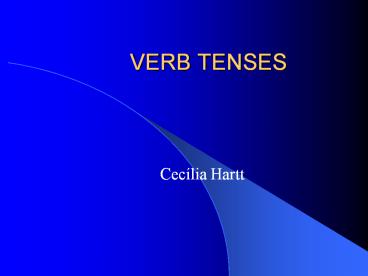VERB TENSES - PowerPoint PPT Presentation
1 / 22
Title: VERB TENSES
1
VERB TENSES
- Cecília Hartt
2
SIMPLE TENSES
- SIMPLE PRESENT
- SIMPLE PAST
- FUTURE
- CONDITIONAL
3
SIMPLE PRESENT TENSE
- Used to talk about routines and habits.
- AUXILIARY VERBS
- DO ( I/you/we/they)
- DOES (he/she/it)
- Used in
- questions
- negative sentences
- Short answers
4
SIMPLE PRESENT TENSE
- I/WE/YOU/THEY
- Do you speak English?
- Yes, I do.
- No, I dont.
- I speak English but not very well.
- I dont speak English very well.
- DONTDO NOT
- HE/SHE/IT
- Does he speak English?
- Yes, he does.
- No, he doesnt.
- He speaks English but not very well.
- He doesnt speak English very well.
- DOESNTDOES NOT
5
VERB S (or) ES (HE/SHE/IT)
- She works a lot.
- She teaches English.
- She goes to work by car.
- VERBES After verbs ended in
- SS/SH/CH/X/Z/O and Y preceded by consonant
6
SIMPLE PRESENT (VERBSES)
- FOR I/YOU/WE/THEY
- KISS
- WASH
- WATCH
- FIX
- BUZZ
- GO
- STUDY
- FOR
- HE/SHE/IT
- KISSES
- WASHES
- WATCHES
- FIXES
- BUZZES
- GOES
- STUDIES
7
PAST SIMPLE TENSE
- Used to talk about what happened at a definite
time in the past. - AUXILIARY VERB
- DID ( I/you/we/they/he/she/it)
- Used in
- questions
- negative sentences
- Short answers
8
SIMPLE PAST TENSE
- REGULAR VERBS
- VERB D (or) ED
- Workworked
- Did you work a lot yesterday?
- Yes, I did. I worked very much yesterday.
- No, I didnt. I didnt work a lot yesterday.
- DIDNTDID NOT
- IRREGULAR VERBS
- (NO RULE)
- Gowent
- Did s/he go to the cinema yesterday?
- Yes, she went to the cinema yesterday.
- No, he didnt go to the cinema yesterday.
- DIDNTDID NOT
9
SIMPLE PAST TENSES
- REGULAR VERBS
- Playplayed
- Studystudied
- Staystayed
- Washwashed
- Watchwatched
- Needneeded
- Loveloved
- Wantwanted
- Likeliked
- IRREGULAR VERBS
- Writewrote
- Readread
- Eatate
- Drinkdrank
- Buybought
- Sendsent
- Comecame
- Teachtaught
- Seesaw
10
SIMPLE FUTURE TENSE
- AUXILIARY VERB WILLVERB (I/you/we/they/he/she/it
) - Used to indicate a decision about the future
taken at the moment of speaking. - I think Ill (I will) go out on the weekend.
- I think I wont (I will not) go out on the
weekend. - Will you follow me? Yes, I will./No, I wont.
11
CONDITIONAL TENSE
- AUXILIARY VERB WOULD VERB (I/you/we/they/he/she/
it) - Used in polite requests, asking for help and to
indicate conditions. - Would you please help me with this?
- Would you open the door for me, please?
- Id (I would) buy a new car if I had money.
- I wouldnt (would not) do that if I were you.
12
CONTINUOUS TENSES
- PRESENT CONTINUOUS
- PAST CONTINUOUS
13
PRESENT CONTINUOUS TENSE
- TO BE (PRESENT)(VERBING)
- Used to talk about actions in progress, happening
now, at the moment. - I am teaching now.
- You are studying now.
- Is she learning?
- They arent playing now.
14
PAST CONTINUOUS TENSE
- VERB TO BE (PAST)(VERBING)
- Used to talk about actions that were in progress
at a definite time in the past. - VERB TO BE (PAST)
- I was we were
- he was you were
- she was they were
- it was
15
PAST CONTINUOUS TENSE
- What was your teacher doing yesterday evening?
- She was working.
- Was she using a computer?
- Yes, she was.
- Were they working too?
- No, they werent.(were not)
16
PERFECT TENSES
- PRESENT PERFECT
- PRESENT PERFECT CONTINUOUS
- PAST PERFECT
17
PRESENT PERFECT TENSE
- AUXILIARY VERBS
- HAVE (I/you/we/they)PAST PARTICIPLE
- HAS (he/she/it)PAST PARTICIPLE
- Used to talk about actions that
- Happened at indefinite times
- Started in the past and continue up until now
- Have a present result
- Can be repeated
18
PRESENT PERFECT TENSE
- For I/we/you/they
- Have you worked at your present job for a long
time? - Yes, I have.
- No, I havent.
- HAVENTHAVE NOT
- For he/she/it
- Has she worked at her present job for a long
time? - Yes, she has.
- No she hasnt.
- HASNTHAS NOT
19
PRESENT PERFECT CONTINUOUS
- AUXILIARY VERBS
- HAVE (I/you/we/they)BEEN(VERBING)
- HAS (he/she/it)BEEN(VERBING)
- It is used to emphasize the continuation of
actions that started in the past and continue up
until now.
20
PRESENT PEFECT CONTINUOUS
- For I/you/we/they
- Have you been working at your present job for a
long time? - Yes, I have been working at my present job for a
long time. - No, I havent been working at my present job for
a long time.
- For he/she/it
- Has she been working at her present job for a
long time? - Yes, she has been working at her present job for
a long time. - No, she hasnt been working at her present job
for a long time.
21
PAST PERFECT TENSE
- AUXILIARY VERB
- HADPAST PARTICIPLE
- IT IS THE PAST OF THE SIMPLE PAST
- Had you seen that film before?
- Yes, I had.
- No, I hadnt. (had not)
22
PAST PARTICIPLES
- IRREGULAR VERBS (Third column of verbs)
- The 3 forms can be the same, only 2 forms can be
the same or the 3 forms can be different - Put-put-put
- Cut-cut-cut
- Teach-taught-taught
- Go-went-gone
- REGULAR VERBS(Third column of verbs)
- ALL PAST PARTICIPLES END IN ED OR D
- Love-loved-loved
- Like-liked-liked
- Hate-hated-hated
- Work-worked-worked
- Study-studied-studied
- Play-played-played






























